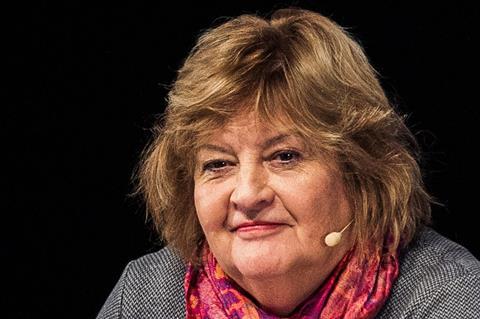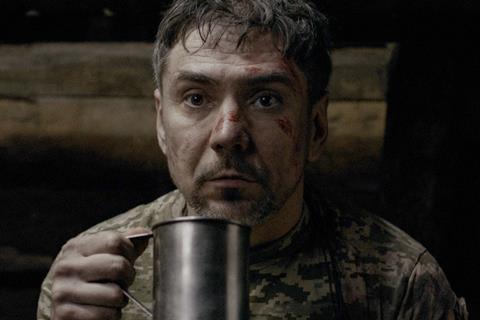
On the eve of Estonia’s Tallinn Black Nights Film Festival (POFF), the event’s director, Tiina Lokk, is concerned about threats to the independence of film festivals. In particular, she is worried about increasing external pressure to play – or not play – particular films.
“There is no right to demand that you should take a film off your programme,” says Lokk. “I don’t want censorship. Maybe it is because of my Soviet past, but I am very strong on this. If we open this Pandora’s box, we cannot manage.”
Lokk, who has run POFF since founding it in 1997, believes major festivals are receiving increased pressure regarding their selection choices, citing the controversy around Anastasia Trofimova’s documentary Russians At War, which shows the perspective of a Russian army battalion in Ukraine.
The film’s North American premiere at Toronto was postponed following criticism it showed Russian propaganda, with Toronto claiming “significant threats to festival operations” led to the postponement. It played in Toronto after the festival closed.
“Festivals should have the freedom to put together the programme they would like to see,” says Lokk, who saw Russians At War when it was submitted to POFF prior to its Venice and Toronto screenings.
She declined the film over Russian propaganda fears – “I can feel the red flag very quickly”.
But Lokk believes the opinions of festival programmers and directors such as herself should be the determining factor in a film’s selection, not external views.
“Venice and Toronto decided to pick up this film, it is their right,” says Lokk. “Nobody can say you can’t show this film.”
The responsibility that falls on festival programmers and directors is to intimately know their programme selections, and be able to justify them on artistic grounds. “If you pick up a film, you have to know why you picked it up,” says Lokk.
She says she has had pressure to withdraw films from her programme, both this year and especially last year; she declines to say which films or who the pressure was coming from. “If I took everything off I was asked to take off, [the festival] wouldn’t happen,” she claims.
While adamant POFF is “not a political festival”, Lokk is trying to “get out in front” of this issue by organising a public discussion between heads of major film festivals, with Venice’s Alberto Barbera and Toronto’s Cameron Bailey among those invited. It has proved too tight to arrange for this year’s event which opens today (November 7) but she remains hopeful of pulling it together for early next year.
Georgian drama The Antique was suspended from Venice’s Giornate degli Autori sidebar following legal action from its minority coproducers. It was then reinstated at the end of the festival. It will play at POFF this month. Lokk says she has not received any pressure on that particular title. The Georgian industry is divided, with many filmmakers joining the independent Georgian Film Institute in opposition to the state-run Georgian National Film Centre.
Lokk says POFF has “big respect for the independent Georgian filmmakers for flying the flag”, with a festival spotlight on their work this year. Separately, The Antique is the only GNFC-backed film in the festival, with Lokk adding she is “not going to fight the filmmakers” on this issue, and will take films from both sides of that divide on their own merits.
Principles
This year’s POFF includes 249 features, with six competitive sections including a new Doc@POFF non-fiction competition.

World premieres include Serhii Kastornykh’s The Mousetrap, a single-actor film about a Ukrainian soldier trapped in a bunker with a rodent, which is playing in competition. It was filmed during Kastornykh’s breaks from military service.
Despite growing concern in Estonia regarding Russia’s military actions, Lokk is sticking to her selection principles and is not afraid of what the neighbouring country thinks. “It is the last thing that is going to bother me, what Russia likes or not,” says the festival head. “The Mousetrap wasn’t picked as a political action. A film must be a masterpiece in my eyes and the eyes of my team.”
Estonian inflation remains among the highest levels in Europe. Budgeted at €2.7m, POFF is operating on a year-to-year basis, Lokk says, and is reliant on strong audience numbers – which are looking good for 2024. “It is a big lesson on how to survive and make a festival when you don’t have money at all.”
Her happiest moment after last year’s event was reading a Facebook comment that said, “I can’t understand what is going on in Tallinn. Israel and Palestine are on the same jury; Serbian and Kosovar and Balkan and Ukrainian and Georgian films [are together] – and everyone is friends and drinking vodka together!”
“This is what I think festivals should be,” smiles Lokk.






![The Brightest SunScreen[Courtesy HKIFF]](https://d1nslcd7m2225b.cloudfront.net/Pictures/274x183/3/5/0/1448350_thebrightestsunscreencourtesyhkiff_312678.jpg)


















1 Readers' comment